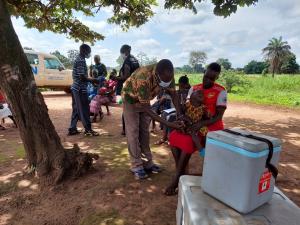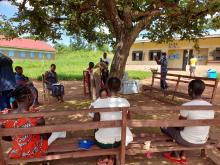Ensuring access to healthcare services in hard-to-reach areas of South Sudan
As a team of health workers from the State Ministry of Health in Western Equatoria and WHO arrived in Nadiangere village of Western Equatoria in June 2021, they were welcomed by cheering residents who gathered at Nadiangere Primary Health Care Unit. The team was distributing medicine and supplies delivered by WHO to a population that had been cut off from vital healthcare services for the last five years.
“It was a surprise to see these health workers bringing medicines to our village and start attending to our needs after a very long time,” said Ms Glady (not her real name), a 31-year-old lactating mother of three and a resident of Nadiangere village. “Now we have something to jubilate about” she added.
Nadiangere village located 137 km North of Yambio town is one of the hard-to-reach areas in Western Equatoria state of South Sudan where access to routine healthcare services have been cut off for five years when the Sue bridge which connected it to the State Capital Yambio and other areas collapsed depriving over 15 000 individuals of the much-needed healthcare services.
In the past, health workers used to reach residents of Nadiangere village during the nationally organized mass polio and measles campaigns. However, inaccessibility has contributed to reduced access to basic healthcare services and increased risk of malaria, measles, respiratory and diarrheal diseases.
Vaccination to protect children from life-threatening diseases
South Sudan is vulnerable to disease outbreaks. In 2019/ 2020, measles, a vaccine preventable disease, caused outbreaks in at least 20 counties.
“My return to Nadiangere a year ago deprived my daughter Naamba access to essential lifesaving vaccines”, said Ms Glady who narrated her ordeal while breastfeeding her daughter Naamba.
my daughter had a chance to get her missed routine vaccines for the first time when WHO and other humanitarian partners visited Nadiangere in June 2021.
Naamba is not the only child who missed out on life saving vaccines, there are many children like Naamba who had never received vaccines which could lead to a resurgence of vaccine preventable diseases.
During the visit, the Ministry of Health with support from WHO and UNICEF vaccinated 171 children and 58 women of reproductive age against vaccine preventable diseases. “Vaccines have prevented countless cases of disease and saved millions of lives”, said Dr Fabian Ndenzako, WHO Representative a.i. in South Sudan. “Thanks to Gavi, the Vaccine Alliance, vaccines protect children against certain specific and serious diseases when they are given at the right ages, and in the required number of doses”.
Vaccination, along with sanitation and clean drinking water, is public health intervention for an improved health outcome globally.
A coordinated health response
To improve the delivery of humanitarian health assistance, WHO and partners recently conducted a Joint Assessment Mission to assess the current status of the humanitarian situation including the health needs of the population in Nadiangere village in Western Equatoria state of South Sudan.
As part of the response to meet the growing health and nutrition needs WHO delivered lifesaving treatments and supplies including trauma, pneumonia, and diarrhea kits.
Besides distributing supplies in flood affected areas, "we continue to work with our partners to assist displaced people through prevention and treatment of communicable disease, and severe malnutrition among children", said Dr Ndenzako.
WHO will also continue to support efforts to enhance South Sudan’s disease surveillance system to ensure the accurate and timely detection and reporting of epidemic-prone diseases to avert further spread and reduce illness and death.
Technical contact:
Dr John Lagu Nyungura, Email: nyunguraj [at] who.int (nyunguraj[at]who[dot]int)
Communications Officer
Mobile: +211 921 647 859
Email: ebrahimj [at] who.int (ebrahimj[at]who[dot]int)
Communication Officer
Mobile: +211 921736375
Email: atema [at] who.int (atema[at]who[dot]int)




